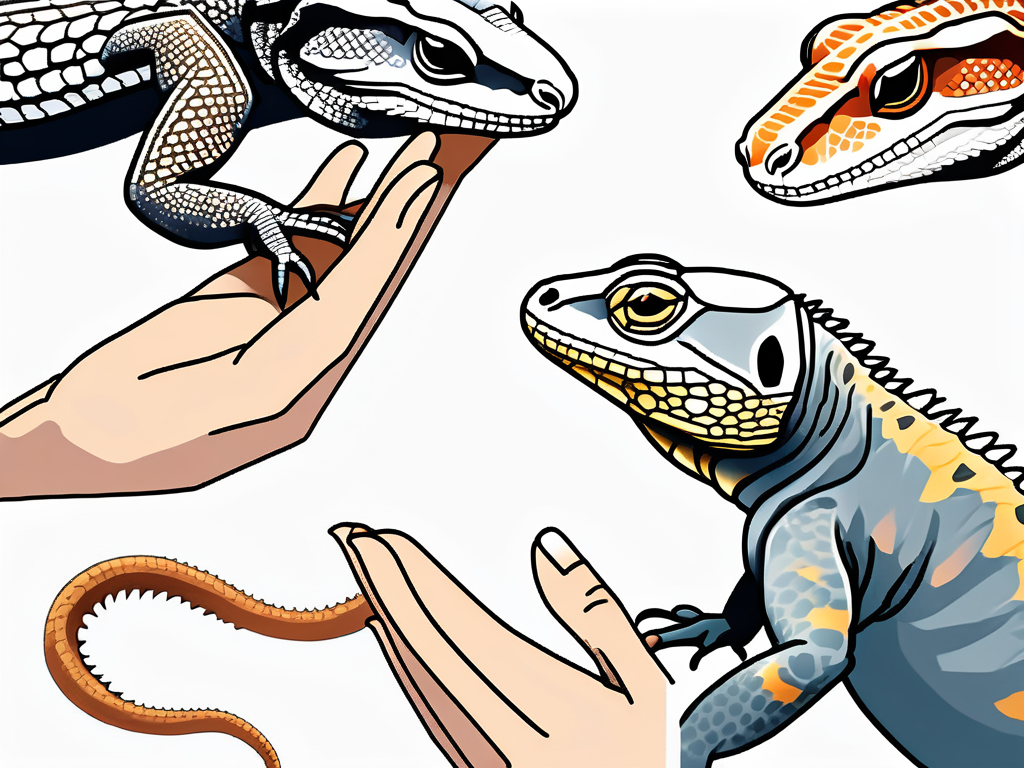Reptiles make fascinating and unique pets, but not all of them enjoy being handled. It is crucial for reptile owners to understand which types of reptiles are more likely to tolerate handling and how to handle them safely. In this article, we will explore various aspects of reptile behavior, characteristics of handle-friendly reptiles, popular reptiles for handling, tips for handling reptiles safely, and the impact of regular handling on these remarkable creatures.
Understanding Reptile Behavior
The Importance of Handling in Reptile Care
Handling is a critical aspect of reptile care as it helps facilitate socialization and can contribute to their overall well-being. By handling them gently and regularly, reptiles can become more comfortable with human interaction, reducing stress levels and enabling easier veterinary examinations.
Furthermore, regular handling can also help in the early detection of any health issues or abnormalities in reptiles. By observing their behavior and physical condition during handling sessions, caretakers can spot any signs of illness or distress, allowing for prompt intervention and treatment.
Factors Influencing Reptile Comfort with Handling
Several factors influence how comfortable a reptile is with being handled. These factors include their species, age, individual temperament, and previous experiences with humans. Some reptiles are naturally more receptive to handling due to their biological makeup, while others may require more time and patience to become comfortable.
It is essential for caretakers to understand and respect the individual preferences and boundaries of each reptile when it comes to handling. By gradually introducing handling sessions and paying attention to their body language and reactions, caretakers can build trust and create positive associations with human interaction for their reptile companions.
Characteristics of Reptiles Who Tolerate Handling
Physical Attributes of Handle-Friendly Reptiles
Certain physical attributes can make some reptiles more handle-friendly than others. Snakes with a docile nature and a moderate size, such as corn snakes and ball pythons, are often more inclined to tolerate handling. Smooth-scaled reptiles, like bearded dragons and leopard geckos, are also generally more comfortable being handled.

Moreover, the body temperature regulation of reptiles can impact their tolerance for handling. Species that are ectothermic, meaning they rely on external sources of heat to regulate their body temperature, may be more docile and receptive to handling when they are comfortably warm. This is because their metabolic processes are more active, leading to a calmer demeanor during interactions with humans.
Behavioral Traits of Reptiles Comfortable with Handling
Reptiles with calm and curious behaviors are more likely to enjoy handling. They may exhibit curiosity towards humans, explore their surroundings willingly, and display minimal signs of aggression or stress. These traits can indicate their suitability for handling.
In addition to being calm and curious, some handle-friendly reptiles also show a level of socialization with their human caregivers. This socialization can develop through positive interactions, regular handling, and environmental enrichment. Reptiles that have formed a bond with their owners are often more relaxed and trusting during handling sessions, as they perceive humans as a source of comfort and security.
Popular Reptiles for Handling
Common Pet Reptiles and Their Handling Tolerance
Several common pet reptiles have a higher tolerance for handling. Bearded dragons, corn snakes, leopard geckos, and ball pythons are often recommended for beginner reptile enthusiasts due to their generally docile nature and greater comfort with human interaction.

Bearded dragons, known for their friendly demeanor and curious personalities, are particularly popular for handling. These reptiles are often seen basking under heat lamps or exploring their enclosures, making them a joy to interact with. Corn snakes, with their vibrant patterns and calm disposition, are another favorite among reptile enthusiasts. Their slender bodies and ease of care make them a great choice for those looking to handle their pets regularly.
Exotic Reptiles That Enjoy Handling
While many exotic reptiles may not appreciate frequent handling, some can still enjoy it when done correctly. Certain species of turtles, such as red-eared sliders and box turtles, may become accustomed to handling over time. Additionally, green iguanas, veiled chameleons, and crested geckos can also show varying levels of comfort with handling.
Red-eared sliders, known for their distinctive red markings on the sides of their heads, are aquatic turtles that can develop bonds with their owners through gentle handling. Box turtles, on the other hand, are terrestrial turtles that may exhibit shy behavior at first but can grow to enjoy human interaction with patience and positive reinforcement. Green iguanas, with their striking green coloration and arboreal habits, may require more careful handling due to their potential for aggression when feeling threatened. Veiled chameleons, known for their unique ability to change color and their casque (helmet-like structure) on their heads, can be rewarding pets for those willing to put in the effort to build trust through handling. Crested geckos, with their soft skin and adhesive toe pads, are gentle creatures that can thrive with regular, gentle handling sessions.
Tips for Handling Reptiles Safely
Reptiles are fascinating creatures that require special care and attention when being handled. Prior to handling a reptile, it is crucial to prepare the environment to ensure safety for both the reptile and the handler. This includes creating a comfortable temperature and humidity level, removing any potential hazards, and washing hands thoroughly to eliminate any scents that may disturb the reptile.

Additionally, it is important to remember that reptiles are cold-blooded animals, which means they rely on external sources of heat to regulate their body temperature. Before handling a reptile, make sure their enclosure is at the appropriate temperature to keep them comfortable and stress-free.
Best Practices for Handling Different Reptiles
When handling reptiles, it is important to approach them calmly and confidently. Each species may have specific handling techniques, so it is essential to research and understand the correct methods for the particular reptile in question. Supporting the reptile’s body properly and avoiding sudden movements are also critical in preventing unnecessary stress or harm.
Some reptiles, like snakes, may be more sensitive to vibrations and sudden movements, so it is crucial to move slowly and deliberately when interacting with them. On the other hand, lizards may require a different approach, such as allowing them to crawl onto your hand rather than picking them up directly. Understanding the unique needs and behaviors of different reptiles will help ensure a positive handling experience for both the animal and the handler.
The Impact of Regular Handling on Reptiles
Reptiles, like any other pet, benefit greatly from regular handling. Not only does it help them become acclimated to human contact, but it also plays a crucial role in reducing their stress levels. When reptiles are regularly handled in a gentle and respectful manner, they can become more comfortable in their environment and with their owners. This increased comfort can lead to enhanced socialization skills, making interactions with these fascinating creatures more enjoyable for both parties.
Moreover, regular handling allows owners to closely monitor their pet’s health. By spending time handling their reptile, owners become familiar with their pet’s normal behaviors and can quickly identify any changes that may indicate underlying health issues. This hands-on approach to care can lead to early detection of health problems, ensuring prompt veterinary attention when needed.
Benefits of Regular Handling for Reptiles
Regular handling can have numerous benefits for reptiles. It helps them become acclimated to human contact, reduces stress levels, and can enhance their overall socialization skills. It also allows owners to monitor their pet’s health more closely, as they become familiar with their reptile’s normal behaviors.
Potential Risks of Over-Handling Reptiles
While regular handling is beneficial, over-handling can be detrimental to reptiles. Excessive stress caused by prolonged handling can compromise their immune system, leading to illness. It is essential to strike the right balance and recognize when a reptile may need a break from handling to rest and recover.
By understanding reptile behavior, recognizing handle-friendly characteristics, and following proper handling techniques, reptile owners can ensure a positive and enriching experience for both themselves and their scaly companions. Remember, each reptile is unique, and it is essential to respect their individual comfort levels and boundaries when it comes to handling. With the right knowledge and care, reptile handling can be a rewarding and enjoyable aspect of reptile ownership.
